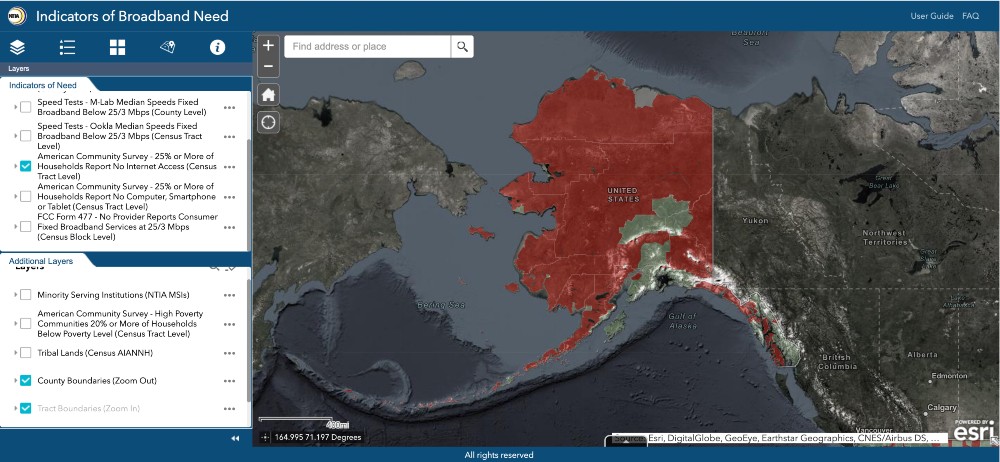
- Details
- By AkiakChief Mike Williams - Native Community
February 25, 2022
The Honorable Gina Raimondo
Secretary of Commerce
U.S. Department of Commerce
1401 Constitution Avenue, N.W.
Washington, D.C. 20230
Re: Broadband in Rural Alaska Must Become a Priority
Dear Secretary Raimondo:
This week, the National Congress of American Indians passed resolution #ECWS-22-011 (attached). Our resolution called on the NTIA to expedite grant review and award processing for the Tribal Connectivity grant applications because our construction window in rural Alaska is short – generally May through September - and this funding is critical for new broadband infrastructure. This letter is to amplify and expand upon this resolution.
Our villages need affordable broadband now, not five or ten years from now. Forcing us into the same one-size-fits-all terrestrial fiber bucket with the Lower 48 states won’t get us there soon enough. We need the flexibility to design our own solutions to meet our own unique needs, not those of the incumbent telecos. To be clear, we welcome fiber where it makes technical and economic sense, but rural Alaska is so vast and the terrain too extreme for a singular solution. Rather, we need the flexibility to add LEO and GEO HTS satellites to the mix where we believe it makes sense. With this approach, we can have a middle mile option that provides coverage over all of Alaska from the first day of deployment. Every rural village, no matter how remote or how few people live there, will have access to broadband the quickest way possible. The Akiak Native community is using this technology and the residents are very happy.
Our political challenges at the State level have been stacked for years with empty promises and no one seems to care. In the 2014 Alaska Broadband Plan, this benchmark was set: “100% of Alaskan households and businesses would have 100/100 by 2020”. In the 2019 Alaska Broadband Plan, this benchmark was set: “100% of Alaskan households and businesses would have 100/100 by 2024”. Promises were made, billions were spent, and few Alaska Native villages have seen broadband extended into their communities. Recently, the Governor’s Alaska Broadband Task Force set a new goal “100% of Alaskan households and businesses shall have access to 100/20 within 5 years.” We’re not holding our breath this time.
While three Federal agencies have multiple broadband funding plans, nothing has changed in terms of fiber middle mile buildout to the rural villages. Currently, Alaska telecoms bring in almost $400M per year considering all funding sources and most of that is spent on user subsidies. Over the last 5 years, that’s nearly $2B and they have $2B more coming. It’s important to recognize that what the Alaska telecoms have been doing in Alaska is not working. Yet they have been successful in blocking our access to other technologies that will quickly deliver middle mile faster and more affordably to preserve their monopoly hold on the state.
Today, there are more than 240 rural Alaska communities that are considered unserved (no service or less than 25/3), 36.3% of rural Alaskans have no wired broadband service (~100,000 residents), and almost 70% of Alaska schools do not meet the FCC benchmark of 1 Mbps for every student. What your agency and other agencies are doing in Alaska is not helping close the digital divide.
We are tired of being pushed out of the room, while Alaska telecoms have been padding their pockets for decades. This is about basic, critical infrastructure in our villages. Hear our collective voice – the Federal infrastructure funds that have been appropriated for rural broadband present a once-in-a-lifetime opportunity to solve a massive problem in rural Alaska. It should bring our villages affordable and fast broadband so that no Alaskan is left behind. Rural Alaska needs the flexibility to solve its unique challenges with a complement of technologies. We will appreciate your making this a top priority and bringing our applications forward for expeditious action along these lines.
Sincerely,
Chief Mike Williams
Akiak Native Community
Area VP of National Congress of American Indians
Chairman of Yukon-Kuskokwim Delta Consortium
Signing as an Authorized Representative for:
Akiachak Native Community
Akiak Native Community
Asa’carsarmiut Tribe
Kasigluk Traditional Elders Council
Native Village of Chuathbaluk
Native Village of Hooper Bay
Native Village of Kwinhagek
Native Village of Napakiak
Native Village of Napaskiak
Native Village of Tuntutuliak
Nunakauyarmiut Tribe (Toksook Bay)
Organized Village of Kwethluk
Pilot Station Traditional Village
Tuluksak Native Community
Village of Atmautluak
Village of Chefomak
Village of Lower Kalskag
Help us defend tribal sovereignty.
At Native News Online, our mission is rooted in telling the stories that strengthen sovereignty and uplift Indigenous voices — not just at year’s end, but every single day.
Because of your generosity last year, we were able to keep our reporters on the ground in tribal communities, at national gatherings and in the halls of Congress — covering the issues that matter most to Indian Country: sovereignty, culture, education, health and economic opportunity.
That support sustained us through a tough year in 2025. Now, as we look to the year ahead, we need your help right now to ensure warrior journalism remains strong — reporting that defends tribal sovereignty, amplifies Native truth, and holds power accountable.
 The stakes couldn't be higher. Your support keeps Native voices heard, Native stories told and Native sovereignty defended.
The stakes couldn't be higher. Your support keeps Native voices heard, Native stories told and Native sovereignty defended.
Stand with Warrior Journalism today.
Levi Rickert (Potawatomi), Editor & Publisher
